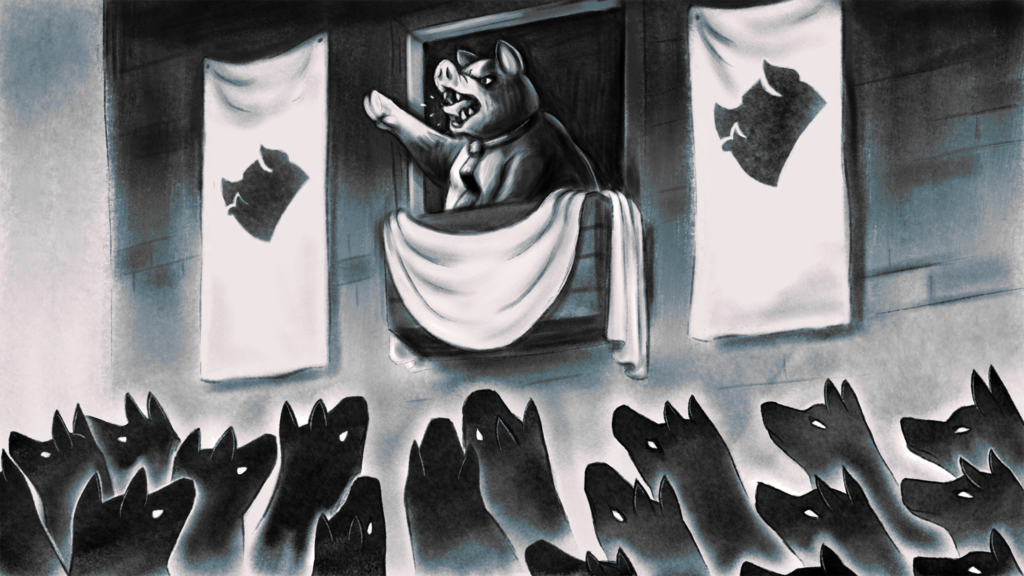As soon as I heard that a game was being made about George Orwell’s allegorical 1945 novel Animal Farm I thought it was an extremely bizarre idea. A novel about an animal society striving for autonomy as it descends into a communist dictatorship isn’t exactly begging for gamification. But now that I’ve gotten to play it, I can say that it’s a surprisingly enjoyable hybrid of visual novel, choose your own adventure story, and farm management simulation. Sure, it may not be the deepest game available in terms of its gameplay mechanics or freedom of choice. However, developer Nerial’s Animal Farm makes up for that by being a very respectful adaptation of the influential novel.
If you’re not familiar with the original story, Animal Farm follows a group of farm animals who rebel against their human owners to start a society of their own with a pig aptly named Napoleon in charge. What starts off as an exercise in earning your keep in exchange for labor within the farm, quickly turns into a totalitarian regime that favors those in power.
George Orwell was not shy about his politics. He was staunchly opposed to communism and totalitarianism. So Animal Farm is a very blatant allegory about the political climate of 1945. It makes plain Orwell’s disdain for Stalin and fascist regimes of the time. Even with that unorthodox setup for a video game, it’s a surprisingly well-realized and entertaining experience from start to finish that manages to keep that spirit alive and well.
The bulk of the gameplay finds you overlooking your farm and making various decisions about how it’s operation. There are a lot of moving parts to manage. Harvesting food before the winter months roll around is crucial. Then, deciding how that food is distributed is equally important because it could mean the animals on your farm will lack the strength to work or even potentially die. And on more than one occasion you’ll be hit with the moral quandary of whether the food stored will be carefully rationed or redistributed amongst the farm’s inhabitants. Animal Farm doesn’t make these decisions feel black and white either. Whatever characters are ignored or catered to will influence certain outcomes leading to one of eight possible endings.
Those endings can often range from full-on death of your farm to a relinquishing of powers or even the strengthening of essentially the totalitarian communism that the novel warned about. Even knowing those potential options, it is often difficult to determine where your story will end up. Unless, of course, you’re making a conscious decision to reach a certain conclusion. For instance, in my first run, I found myself reaching an extremely dark and bleak ending that almost felt like it came out of left field. The illusion of choice is often an issue in Telltale-style games and it feels at times that Animal Farm does fall prey to that.
One of the other mechanics that are at play is some very light building management. And when I say light I mean it. Throughout the game’s yearlong cycle, you’ll occasionally have to repair your barns after various events like snow or rainfall hit. Of course, if you’re familiar with the novel, you’ll recognize the option for the creation of a windmill to be a major plot point that can have positive or negative consequences depending on how you try to go about it. Unfortunately, there isn’t a whole lot of depth to it. Really, it all amounts to just deciding if it should be handled or not. Yes, your inaction could very well lead to your hardworking horses or your milk-producing cows getting sick or possibly dying. That said, I continually found myself wishing there was a bit more to it.

There is also a very bare-bones combat system. You’ll see this when either your animals are on the offensive against other neighboring farms or you’re defending against the farmers that you forced out previously. There isn’t much here though, and it’s probably the weakest aspect of the game. Your animals have commands that you can select, but I have never come across any consequences from simply attacking. Further, I never found myself in danger of losing any battles. Whether from a lack of units or from being overwhelmed, the threat just isn’t really there. I understand the combat isn’t necessarily the main focus of the game. That said, some depth would have been better than none at all.
I was curious about how Animal Farm would translate to a video game medium from the moment I heard it was in development. It may not be the deepest or most-groundbreaking game of its type. And a lot of the mechanics may not have much to really dive into. However, it mostly sticks the landing. This is a better adaptation than I expected it to be. The devs even allow for at least some choice and deviation from Orwell’s source material. It’s also very commendable for a game these days to be blatantly political in a time where a lot of AAA studios won’t even touch something close to this.
Animal Farm, like the novel it’s based on, has a very clear stance. It doesn’t shy away from the themes of anti-fascism and totalitarianism. Games as a medium have the opportunity to tell a wealth of stories. Political ones like this should always be welcomed no matter what the current state of affairs may be in the real world.
The post Orwell’s Animal Farm Review — Absolute Power Corrupts Absolutely by Camilo Olmedo appeared first on DualShockers.
